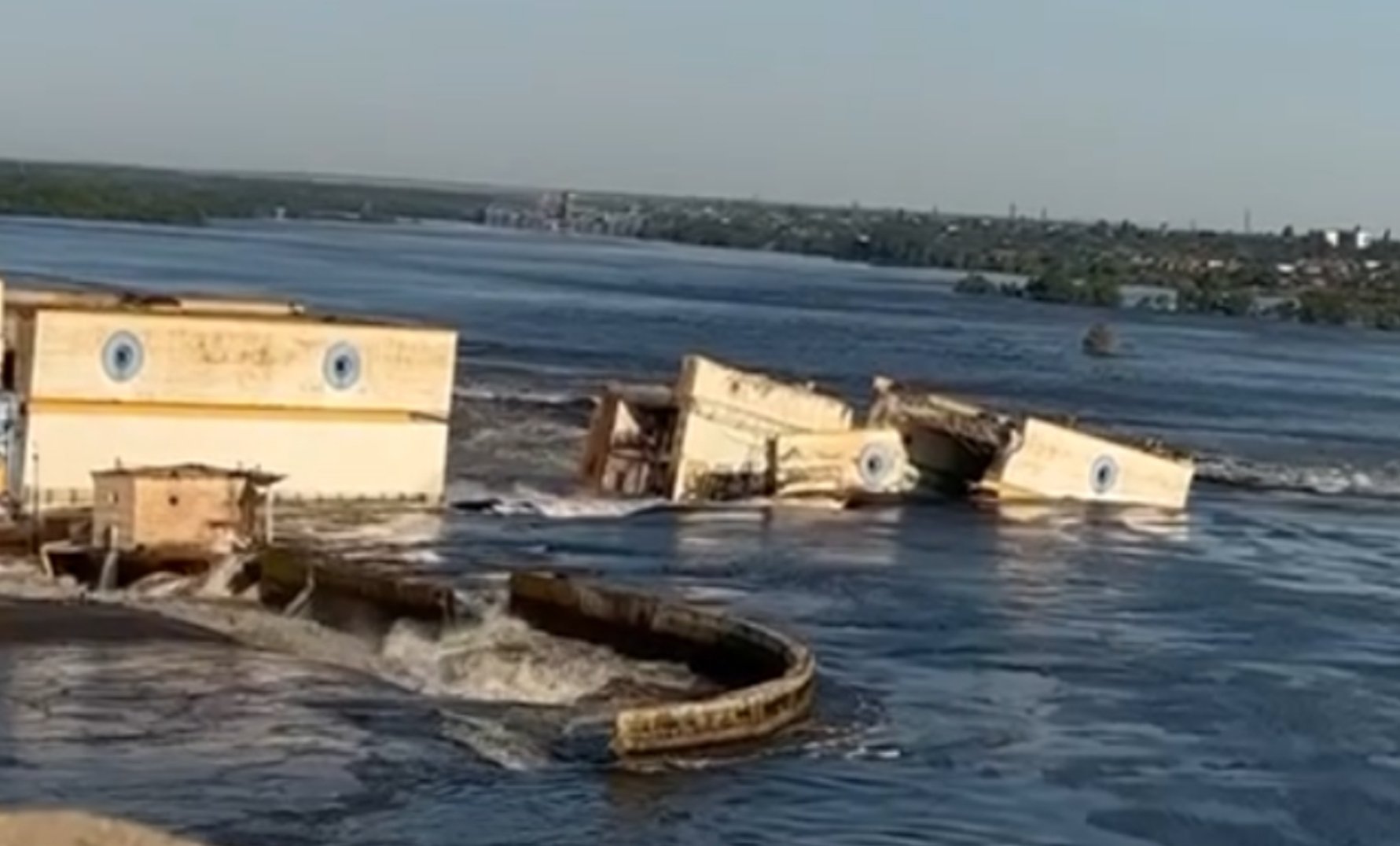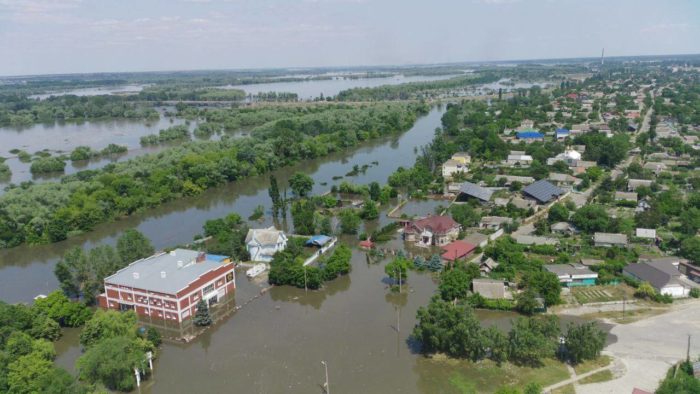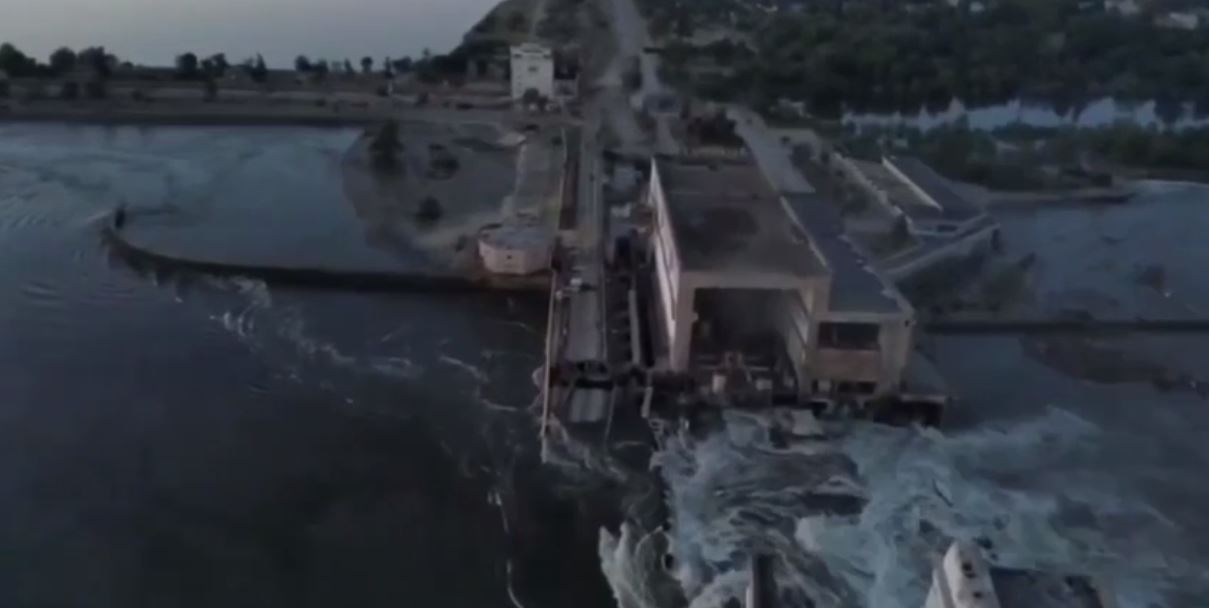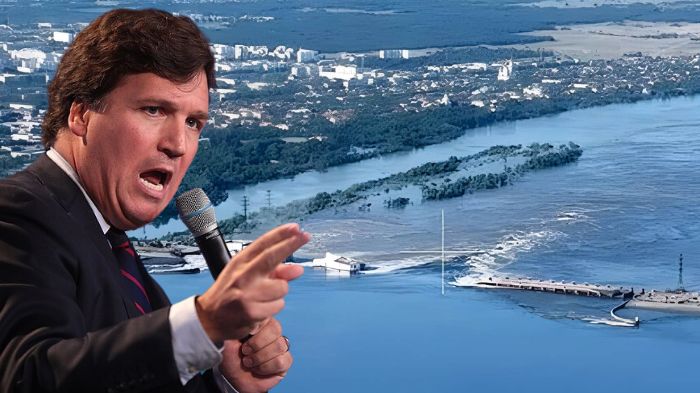In the deep night of 6 June, residents of the Russian-occupied town of Nova Kakhova were awakened by a loud sound they never heard before. In panic, they rushed to a local online group on Telegram to discuss what it was — going outside was impossible because of a curfew imposed by Russian troops. Only in the morning were their suspicions confirmed: the dam to the Kakhovka reservoir was destroyed and gushing water was flooding their city.
Ukrainian authorities accuse Russia of deliberately blowing up the dam, and the CEO of Ukraine’s hydropower operator Hydroenerho said that Russians placed explosives in the lower levels of the engine room, causing it to break in half. Meanwhile, Russian President Putin’s spokesman Peskov has talked about Ukrainian “deliberate sabotage” on the Russian-controlled dam while a Russian quisling official accused Ukraine of causing the destruction with “numerous strikes” — a claim ruled out by a top Ukrainian dam engineer, who explained that the dam was designed strong enough to withstand a nuclear strike, let alone artillery shells.
We got in touch with earwitnesses of that night to see what the situation looked like from inside Nova Kakhovka.
Tetiana was deep asleep on 6 June when a profound blast woke her up around 2:15. In general, Nova Kakhovka is no stranger to explosions and sounds of warfare, having been under Russian occupation since February 2022. Tetiana had learned to distinguish between incoming and outgoing fire.
But this blast was strange, she says, as she recalls going to the online Telegram group, where others posted about hearing the blast. However, nobody understood what it was from, because they had never heard something like that before.
“It wasn’t like anything else, not simply incoming or outgoing fire. It really was like a strange explosion,” Tetiana, who lives four kilometers from the dam says, recalling that the blasts repeated several times. When they subsided, she tried going back to sleep, but in ten minutes, profound explosions started again. Her house started vibrating; two explosions were so strong that a metal awning on her balcony started reverberating.
Afterward, the explosions subsided, but a rumbling sound started from the direction of the river, Tetiana, who lives 200 meters from it, experienced a smell resembling sewage or the swamp.
“We have islands between the left and right bank of the Dnipro, and water there gets stale. Apparently, the rush of water got it flowing out,” Tetiana told.
Others in the group also heard the water rushing and trees being broken. Tetiana saw signal rockets being fired – “by the soldiers in trenches on the shore.”
“And then we understood that something terrible had happened. We could not believe it. And around 5 AM we saw the video and understood that a catastrophe has happened.”
Breaking. Russian troops have blown up the Kakhovka HPP dam.
Evacuation of locals at risk of flooding is underway and Zelenskyy is convening a NSDC meeting.
🎥 https://t.co/ryEn69RPeN pic.twitter.com/h0TjSb7KZK
— Euromaidan Press (@EuromaidanPress) June 6, 2023
What does Tetiana think happened to the dam?
“There’s, of course, a 0.000001% possibility that it collapsed by itself. One, it’s too big a coincidence, all those explosions, one by one. Two, I was born in this city and lived here all my life. And we all know the history of the construction of this hydropower plant. It was built from ultra-strong concrete. The piers were projected to withstand not only an earthquake, but a nuclear strike, because of the fear of nuclear strikes in the USSR.
In the 2000s, I was commuting to my studies through the dam to Beryslav. And they decided to replace the road pavement, because it had been around since the 1950s, so it needed to be replaced for safety. Their goal was to demolish the asphalt, well, it was not asphalt but the concrete that was used to build the Kakhovka hydroelectric station itself, its pillars. They couldn’t break it, do you understand? It was like iron. And there were so many rockets fired at that unfortunate power station, both ours and theirs. Well, it didn’t collapse despite all that.
And here, only once, supposedly, Ukrainian rockets came in and it simply cracked. You could theoretically imagine rockets damaging the sluice gates. But in the video of the damage, you can see the building of the machine section, such a long, long building which was also constructed from ultra-strong materials. It just split apart like a building built from Legos, which then went underwater. A rocket couldn’t split the building into three parts like that. It could only happen from the inside. Again, this is just my personal opinion,” Tetiana says.
Dam of Kakhovka hydropower plant significantly, but not fully, destroyed – 🇺🇦Army Spox Humeniuk
Says it’s visible that damage resulted from internal detonation, not strike, but from an internal detonationhttps://t.co/dUUF3bqOJf
🎥 Early video of damage to the dam shared on TG pic.twitter.com/pAa0vvOjRH— Euromaidan Press (@EuromaidanPress) June 6, 2023
Like Tetiana, Serhiy is used to all sorts of explosions in Nova Kakhovka — usually, it was outgoing Russian artillery fire on the Ukrainian positions across the Dnipro. But the one that woke him up at 2:15 AM was something different.
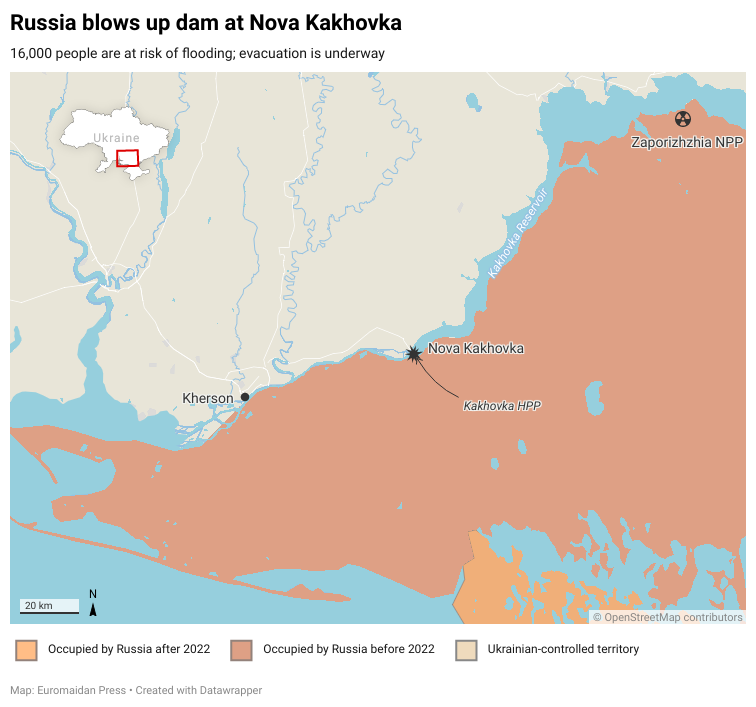
“It was totally another explosion, it was like nothing I felt before,” Serhiy, who lives 2.4 km from the dam, said.
Afterward, machine gun fire was heard, “as usual,” and artillery fire, but only outgoing fire.
Serhiy’s friends also heard the explosion; “the whole city heard it; everyone is terrified of the events.”
What does Serhiy think about the version that it was incoming Ukrainian artillery fire that broke the dam?
“If it was incoming fire, I would have heard it. But there was no incoming fire, it was just some sort of push and then explosion. Maybe the dam indeed broke through by itself. I’m no expert, it all needs checking. But it’s the second year that we are living here throughout artillery strikes; I know the sound of incoming fire, and there was no incoming fire,” Serhiy tells.
The dam was indeed damaged from earlier strikes, but the construction was designed to withstand very powerful explosions, Serhiy says.
“I doubt that it could have been simply damaged by rockets or something else; you can see that the bridge is completely gone; I can suppose that it was some special detonation.”
Central Nova Kakhovka was flooded, as was the waterfront area. Now, the water level has subsided in the city; as per Serhiy, Russian soldiers are breaking into and occupying the flooded houses that were abandoned by locals.
But Russian-occupied villages downstream were totally flooded, with only volunteer rescuers offering help to flood victims stranded on the roofs of their houses.
Related:
- Frontline report: Kakhovka flooding prompts Ukraine to evacuate troops from Kherson islands
- Russians blew up Kakhovka Dam using explosives planted there last fall – Danilov
- Ukrainian dam engineer rules out self-destruction of Kakhovka dam
- Kakhovka dam to deteriorate further over next days, causing additional flooding – UK intel
- Kakhovka Dam was built to withstand nuclear strike, couldn’t be destroyed from outside – Ukrhydroproject engineering company
- Zoo that survived Russian occupation destroyed by Kakhovka flooding; all animals dead




